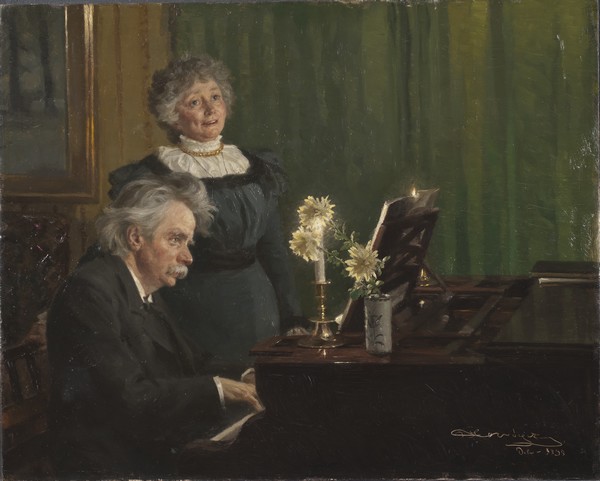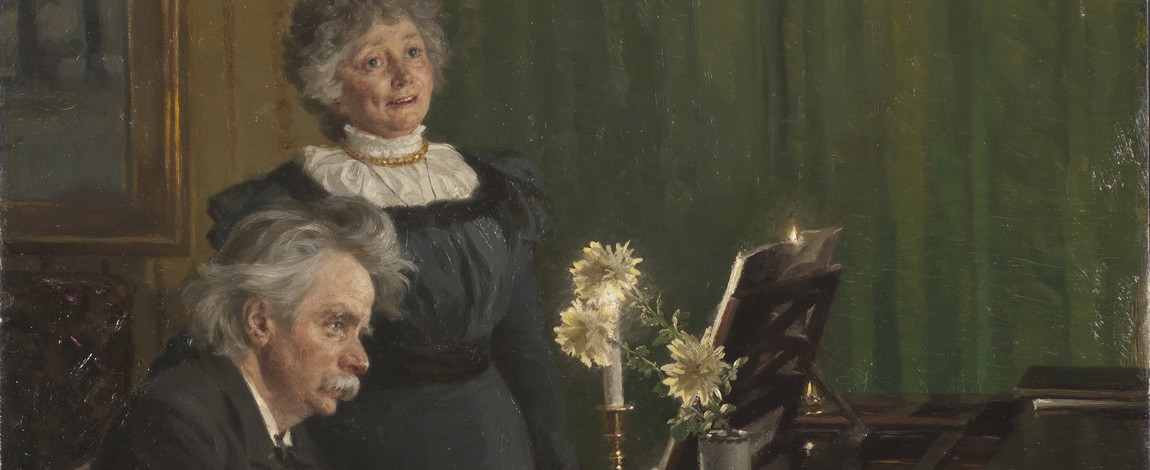This week, we have a guest post from Robert Garrigós, who previously presented us the Viquiprojecte Lieder. His proposal is again really interesting: recovering the lied sung in Catalan. Take a look, think about it, and let us know what you think. To illustrate the article musically, we will listen to Jeg elsker Dig / Ich liebe dich by Edvard Grieg, in the versions that Robert has chosen: Miah Persson and Roger Vignoles (the Danish version) and Jonas Kaufmann and Helmut Deutsch (the German version).
Thank you, Robert!

What are the benefits of understanding the sung text? Why can’t we bring back a tradition that wasn’t so unthinkable in other times, or that is more common in other genres today?
When I speak of Lied in Catalan, I don’t mean Catalan Lied sung in Catalan, but rather German, English, or French Lied sung in Catalan. And I ask myself, why not? I know this is a topic where many have strong opinions, but I ask for a bit of patience and that you continue reading the arguments I will present, which in no way are against continuing to listen to Lied in its original language.
I’ll start with this concept of “original language”: if I tell you there is a Lied titled Jeg elsker Dig, which you’ve surely heard many times, you might not know what I’m talking about. But if I say you probably know it better as Ich liebe dich, and that it’s by Edvard Grieg, I’m sure you’ll recognize it. I don’t know whether Grieg composed the song using Hans Christian Andersen’s Danish text, and it was later published with the singable German translation by Franz von Holstein, or if it was the other way around. Although, if the information found on lieder.net about these two texts is correct, the Danish text was written in 1833 and the author of the German translation was born in 1826: I’d bet my boots that the seven-year-old Franz wasn’t that much of a prodigy. In any case, here we have a song much more famous in its translated form than in its original one.
How many readers of this blog have had the fortune to read Ithaca by Kavafis in its original Greek version? Or had the patience to read Shakespeare’s sonnets in their original old English? We owe much to Carles Riba or Salvador Oliva, who have brought us poetry we otherwise wouldn’t have been able to fully grasp. And nobody makes much fuss about reading translated poetry. So why should it be different with Lieder, also called poetic songs? It’s true that Lied has a musical component that allows us to appreciate its beauty even without strictly understanding the lyrics, but are we not missing something?
Of course, we have translations printed in the program. But reading a translation is not the same as understanding the sung text; it’s reading a translation. I’m talking about catching every nuance of each word being sung. If you know German well enough, you are lucky. However, the vast majority of a concert audience is not that lucky. Not to mention that a singer interpreting a song in their native language surely has a deeper connection with it than with a language they might not master as well. If the performer truly feels what they are singing from the depths of their heart, won’t that message come through more clearly to the audience?
On this subject, I’d like to share a brief anecdote from a concert at this year’s Schubertiade, which I attended. The singer was the Swedish soprano Malin Byström, and she sang Lied in French, which she performed very well. However, in the second part, she sang some beautiful songs by Ture Rangström, a Swedish composer from the early 20th century, and I had the feeling that it was at that precise moment that we began to hear the true Malin Byström, who had seemed a bit over sung until then. She was singing in her native language, of course.
Finally, the practice of singing music—whether Lieder, classical, or not—in translated form has not been unusual in the past, as is the case with Lieder, but it’s also not uncommon today in other genres, like musicals, which are often translated without hesitation. Even opera is performed in singable translation, such as in London, where there’s an entire opera house dedicated to performing operas in English, ENO, whether they are by Mozart, Verdi, or Puccini. In the words of ENO itself, “singing in English (insert your native language here) enhances the emotional connection between performers and the audience.”
In our own country, we have the example of the massive work done by the Wagnerian Association of Barcelona and its president, Joaquim Pena i Costa, who were responsible for translating in a singable form, editing, and performing the compositional corpus of Richard Wagner and more than 3000 Lieder (mainly German) during the first half of the 20th century. This work, which I have set out to recover and bring back to prominence through Lied.cat and the Joaquim Pena Project, includes translations, by Pena and other contemporaries of his, that are now in the public domain, hidden in various libraries and archives in Catalonia, many of them handwritten on the original scores. These texts have been cataloged by Salvador Parron in his dissertation “The Lieder Translations of Joaquim Pena: Inventory and Analysis of Cultural and Musical Impact”, which serves as the basis for the transcription and public dissemination efforts I am working on with the Joaquim Pena Project.
To wrap things up, it’s worth noting that translating poetry (and theater) is something we’re very used to; performing translated Lied was very common in the past, and performing translated opera or other genres like musicals is still common today in various parts of the world. So why can’t we try listening to translated German or English Lied? Of course, the singable translations need to be careful (and they come with added challenges), but for the sake of improving communication, isn’t it worth the attempt? I believe so, and that’s why I invite you to give it a try whenever you have the opportunity. Yes, it will require programmers to take a chance and the audience to try it with an open mind, even if only occasionally, but I assure you, you’ll be pleasantly surprised.
Du mein Gedanke, du mein Sein und Werden!
De meines Herzens erste Seligkeit!
Ich liebe dich wie nichts auf dieser Erden,
Ich liebe dich in Zeit und Ewigkeit!
Ich denke dein, kann stets nur deiner denken,
Nur deinem Glück ist dieses Herz geweiht;
Wie Gott auch mag des Lebens Schicksal lenken,
Ich liebe dich in Zeit und Ewigkeit.
You my thought, you my being and becoming!
You my heart’s first bliss!
I love you like nothing on this earth,
I love you now and through eternity!
I think of you, I only can think of you,
My heart is only to your joy dedicated;
However God may direct the fate of life,
I love you now and through eternity!
Du er mit Hjertes første Kærlighed.
Jeg elsker Dig, som Ingen her på Jorden,
Jeg elsker Dig i Tid og Evighed!


















Comments powered by CComment